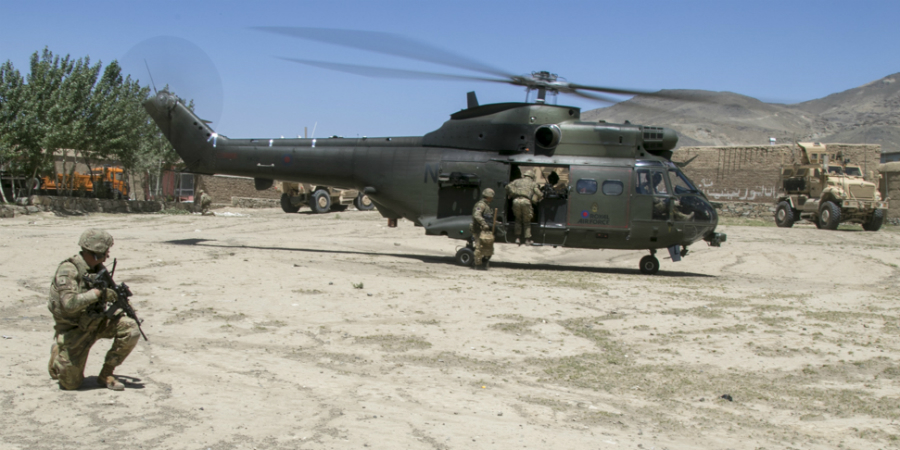The Afghan Stag Hunt
The heated debate about the possibility of a U.S. troop withdrawal from Afghanistan, prompted by recent negotiations between the U.S. government and the Taliban, has focused understandably on the military value of security assistance.

Published by The Lawfare Institute
in Cooperation With

The heated debate about the possibility of a U.S. troop withdrawal from Afghanistan, prompted by recent negotiations between the U.S. government and the Taliban, has focused understandably on the military value of security assistance. Some observers argue that a precipitous American retreat will leave the country—and even the capital, Kabul—vulnerable to an emboldened, undeterred Taliban given the limited capabilities of Afghanistan’s national security forces. Those in favor of withdrawal are skeptical that a few thousand U.S. troops can make a decisive difference when 100,000 U.S. soldiers proved incapable of curbing the insurgency.
The real peril of a hasty withdrawal of U.S. troops from Afghanistan, though, can best be understood in political, not military, terms. The most important role of the U.S. presence is to keep the Afghan state afloat, and while the negotiations may turn out to be a positive development, U.S. troops must remain in the near term to ensure the possibility of a credible deal. If the United States beats a quick path to the exits, the incentives for Afghan power brokers to go it alone and engage in predatory, even cannibalistic behavior, may prove irresistible. A sudden drop in current troop levels will likely trigger a series of responses that undermine the very peace and stability the United States hopes to achieve.
The ultimate resolution of the war in Afghanistan will involve a complex set of interlocking bargains, and the presence of U.S. forces represents a key political instrument in those negotiations. These talks involve a wide range of Afghanistan’s political elites, many of whom are often painted as a motley crew of corrupt warlords engaged in tribalized opportunism at the expense of a capable government and their own countrymen. But, after nearly two decades of participation in the country’s fledgling democratic politics, economic reconstruction and security-sector development, many of these strongmen have grown invested in the Afghan state’s survival and the dividends that they hope will come with greater peace and stability. At key moments, the cooperation among Afghan politicians has been maintained with a persuasive nudge from U.S. diplomats. The ongoing U.S. presence in Afghanistan not only enables the increasingly capable Afghan National Security Forces to secure more of their homeland, but it also serves as a very important political signal. It sends a message to the country’s fractious elites that the rewards for cooperation remain far richer than those that would come from going it alone.
A classic game theoretic allegory best demonstrates the various incentives at stake for the United States and Afghan political elites at this moment. The 18th century political philosopher Jean-Jacques Rousseau famously described a dilemma that arises when a group of hunters sets out in search of a stag: To catch the prized male deer, they must cooperate, waiting quietly in the woods for its arrival. While they lie in wait, uncertain of their prospects, rabbits hop by, tempting members of the band to defect in favor of smaller but surer prey. Any individual move to capture a rabbit will guarantee a small meal for the defector but ensure the loss of the bigger, shared bounty. If, by contrast, each hunter patiently keeps his or her post, everyone will be rewarded with a lavish feast.
Members of the Afghan political elite have long found themselves facing a similar trade-off. Like the hunters in the woods, Afghanistan’s political elites have a great deal, at least theoretically, to gain from sticking together. Catching the stag—the peace and stability required to keep Afghanistan from becoming a haven for violent extremism—would bring political, economic, and social dividends for all of them. The United States is in the hunt, too. The stag is the reason the United States and its NATO allies grew concerned with Afghanistan’s internal political affairs in the first place, and they remain invested in preventing networks, such as al-Qaeda and the Islamic State, from employing Afghan territory as a base. A major terrorist attack launched from Afghanistan would represent a kind of “equal opportunity disaster” and should make a commitment to establishing and preserving a capable state of ultimate value to all involved.
Despite the damage it could cause, the impulse to go it alone has never been far off, given the profound uncertainties that define the politics of any war-torn country. Rabbits come in the form of different opportunities for short-term gain by way of graft, electoral fraud, and the threat or use of force. These remain real temptations for a political elite that has survived decades of war by making deals based on short time horizons and low expectations for peace. But, at various critical junctures, including the country’s highly contentious presidential elections in 2009 and 2014, rivals have ultimately opted to stick with the state rather than contest it. In so doing, they have maintained a kind of “limited access order,” drawing material and political benefits from cooperating with one another, most recently as part of the current National Unity Government. This may not amount to a recipe for good governance, but it has meant the preservation of a credible bulwark against state collapse.
War is anarchic, and intervening actors can sometimes help to mitigate the chaos. Scholars of civil war have argued, for example, that peacekeepers can preserve lasting cease-fires by enabling warring parties to cooperate with the knowledge that their security will be guaranteed by a third party. If, by contrast, the prospect of a return to anarchy looms, trust erodes and short-sighted self-interest wins the day. In the current Afghan context, the role of the U.S. military is not that of third-party peacekeeper, required to guarantee the peace in disinterested terms; it has the arguably less burdensome job of sticking around as one of several self-interested hunters, all of whom must stay in the game or risk its collapse. A hurried U.S. exit will incentivize Afghanistan’s various competing factions more than ever before to defect in favor of short-term gains on the assumption that one of the lead hunters in the band has given up the fight. They will be tempted to use the prospect of negotiations with the Taliban and the upcoming election season to score quick points at their rivals’ expense, foregoing the kinds of political cooperation that have held the country together until now. From that moment on, the tenuous bonds keeping together the larger band of weary, untrusting hunters will break and the stag will be lost.
The coincident timing of high-profile talks with a leaked report that President Trump seeks to reduce troop levels by half has already triggered a political frenzy in Kabul. Individuals, factions and coalitions previously on the same pro-government side have begun to trade accusations with one another. Some have accused rivals of being Taliban sympathizers while others have condemned their counterparts for being against peace. Not wanting to miss out on the high geopolitical drama, Moscow invited Afghanistan’s former president, Hamid Karzai, and a cohort of powerful elites—among them rivals of the current president—to sit down with a Taliban delegation last week. The response from Kabul involved a predictable combination of derision and alarm, for fear that bargaining will commence on terms beyond the current administration’s control.
As the infighting continues, the impulse to forego the elusive stag in favor of the rabbits on offer will grow stronger by the day. The complex machinations required to create a lasting peace may well be under way, but any viable agreement—and the eventual withdrawal of U.S. forces that would entail—requires an Afghan government capable of holding its ground on behalf of its citizens and in the ongoing struggle against violent extremism. This means that it remains in U.S. interests to stay in the hunt for now, because, if the game theorists are right, that may actually be the best path to bringing our troops home for good.





